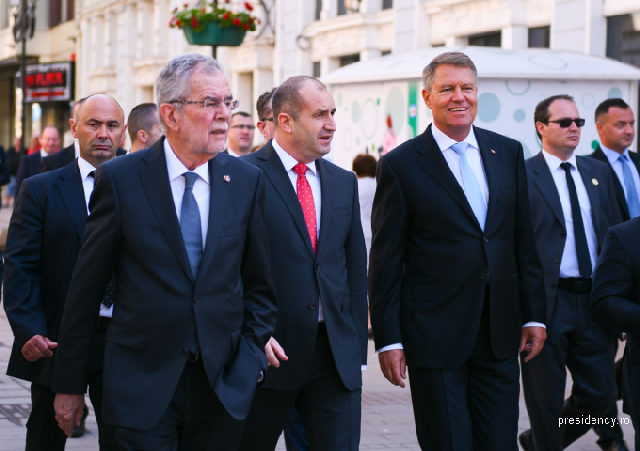Austria – Bulgaria – Romania talks on the future of Europe
Romanias president has traveled to Ruse, Bulgaria, for talks with his counterparts from Bulgaria and Austria.

Corina Cristea, 07.05.2018, 13:16
The European Union must deal with many challenges, with multiple and complex political, economic, military, technological, informational and cultural dimensions. In order to be successful in this complex security environment we need a long-term vision, clear priorities and integrated efforts. This statement belongs to Bulgarian president Rumen Radev who held talks in Ruse, Bulgaria, with his counterparts from Austria and Romania, Alexander Van der Bellen and Klaus Iohannis respectively, in a summit especially designed for this format as the three countries are successively holding the EU Council’s rotating presidency.
The unanimous opinion has been that the half-year presidency is not a short term, but against the background of the global vision on EU development, the mandate is not long either. For this reason, a very good coordination is a must. Austria is taking over the presidency from Bulgaria in summer and Romania will be heading this forum in the first half of 2019. There are many challenges ahead, we face crises every year and new ones are emerging but if we stick to our values, to solidarity, unity, cohesion and equal treatment for all EU members, we create added value for the entire Union, the Romanian head of state, Klaus Iohannis, has said.
The Romanian official has also pleaded for a time of reflection on the European Union after 2019. We need to do that. It is not enough, as we can see from the citizens’ feedback, to tackle concrete issues, to talk about commerce, about the freedom of movement. People want more. They want security, safety, safe borders, unity inside the EU and also determined politicians, entirely devoted to solving the EU issues, Iohannis has added. Topical issues regarding the future of the EU have been tackled, including the post-Brexit situation, but also regional cooperation, aspects related to the security environment — such as the prospects of the European project, the migration crisis and the European asylum-granting system.
The future of the Western Balkans and the exact dimension of their European prospect has also been discussed, and so has the multianual financial framework and whether this guarantees not only the EU’s economic development but also the cohesion policy and real convergence. Europe’s digital future was also high on the meeting’s agenda, along with its readiness to respond and thwart any terror attack. Participants have also discussed the future of the young generations.






























